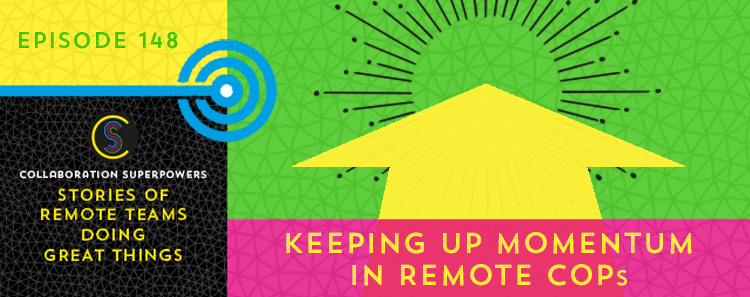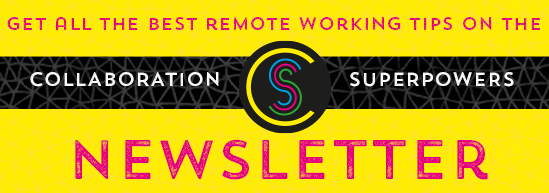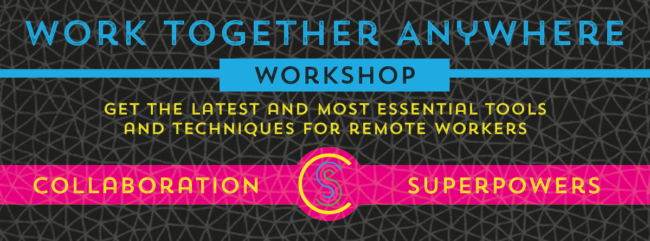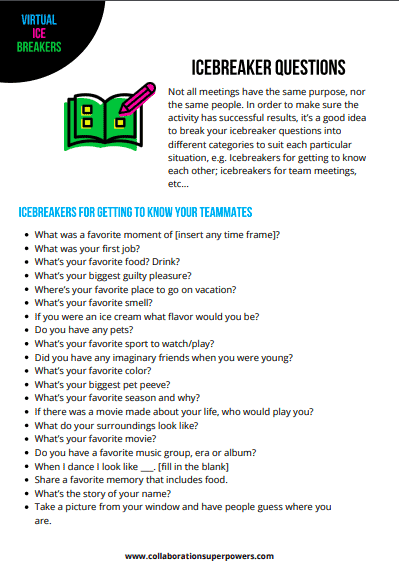This podcast episode is dedicated to the ingredients and tips needed to build a successful online community of practice and keep it going.
Subscribe to the Collaboration Superpowers Podcast on iTunes or Stitcher.
Ingredients to build a successful online community of practice
- HAVE A USEFUL PLACE. Whether it is online or offline you need to have a place where people that share common interest can get together.
- GET SOMEONE WHO WILL GET THE PROJECT STARTED. It is important to find someone who can get the project started and connect with people that share the same interest.
- HAVE A SAFE AND TOLERANT ATMOSPHERE. You need a place where experimenting and playfulness are allowed and even encouraged.
- HAVE ONE OR MORE PEOPLE WHO ARE EXCELLENT AT THEIR CRAFT. When you have people that are excellent at their craft they will inspire, delight, and motivate others.
Tips to build a successful online community of practice
- HAVE A REGULAR SCHEDULE. By keeping a regular schedule, people will begin to trust as they will have a reliable time they can count on you.
- CREATE SUMMARIES. Create summaries of events and take pictures for those who couldn’t attend the event.
- GET OTHERS TO HELP YOU OUT. If you are leading a remote community of practice you can find the champions in your community and ask them to help you out.
- HAVE YOUR WEBCAMS ON. When you are at a meeting or hosting a webinar, have your webcam on. Meetings are more fun when the members can see each other.
- HAVE THEMES. Having a theme can bring out people’s creativity. From togas to silly hats, themes are a perfect way to learn new thing about each other and introduce people to each other.
- MIX UP THE FORMATS. To keep the attention of your community you need to try new things and mix things up a bit. You can try new icebreaker questions, changing the presentations or bringing speakers.
Podcast production by Podcast Monster
Graphic design by Alfred Boland
More resources
Social group sizes, Dunbar’s number and implications for communities of practice by Emily Webber
Original transcript
Speaker 1: This episode is brought to you by LeadWise, a home for business leaders to get practical tools and education in order to lead in today’s changing world. I spoke with Jane, a participant from the LeadWise academy, about how it offers new ways of learning through online experiences. Jane, what was so special about LeadWise?
Jane: The Practical Self-Management Intensive gave me the opportunity to learn from people who have diverse experiences with self-management. Our host, coaches, guest speakers, and my fellow participants, it felt like joining a welcoming and knowledgeable community.
Speaker 1: LeadWise, a company that curates and delivers learning experiences and tools that work because the way we work is no longer working. To sign up to LeadWise academy, go to leadwise.click/cs.
Lisette: Welcome to the Collaboration Superpowers podcast. My name is Lisette and I’m interviewing people and companies doing great things remotely. Hello, everyone, and welcome to episode number 148. On the day that I’m recording this, it is a heat wave in the Netherlands. It’s 33 degrees Celsius, which is about 90 degrees Fahrenheit, which doesn’t sound that hot to some people in the world. But for us in the Netherlands, this is pretty warm. Normally, what I do to cool down is I open the window in the front room and the door in the back room and then there’s a strong breeze that flows through. But while I’m recording the podcast, I wanted to have the sound quality be as good as possible. So everything is closed up. My goal is to record this as fast as possible so that I can get the doors back open again.
Today’s podcast is inspired by somebody who emailed me after a webinar I did with Luke Hohmann in Scrum alliance on communities of practice. And after the webinar, I got an email from someone who said, “I’m struggling with keeping up the momentum with my group of Scrum Masters in the community of practice. How can I do that?”
So today’s episode is dedicated to answering that question. How do we keep up the momentum in a remote community of practice? Keeping up momentum on any online community is a challenge. Everyone struggles with it. And I spent years building online, private, social networks for many, many organizations, so I’ve seen this firsthand. And in my opinion, when you see great, prolific communities forming, there are some particular ingredients that are always there that cause these great, prolific communities to form. The first ingredient, of course, is having a useful place where people with common interest can get together. Whether that’s online or offline, if we want people to come to our communities, we need to pull them in with useful content.
The next ingredient is having someone who’ll get project started and connect people with similar interests, kind of a party hostess who welcomes everybody and gets the conversation started, someone who’s looking for opportunities to introduce people to each other.
The third ingredient is having a safe, tolerant atmosphere where experimenting and playfulness are supported and encouraged, even.
And the fourth ingredient is having one or more people who are just excellent at their craft. I find that in every movement, there are always one or more people who are just masters at what they do, true virtuosos. And those people really inspire and delight and motivate others. You can think of them as like the Jimi Hendrixes of the community, the people where you just go, “Wow! Where did that guy come from?” So now that we’ve got the ingredients defined, now let’s actually get into some specific tips for keeping up the momentum on a remote community of practice. This first tip I actually learned from a club owner in San Francisco, and that tip is keep the schedule as regular as possible. Even if people don’t show up, be there. Open precisely the time that you say you’re going to open, and close precisely the time that you say you’re going to close. That regularity will give people the confidence that they know that you will be there when you say you’re going to be there. And even if you host an online event and no one shows up, you can use it as an opportunity to record a short video tip or message to the group or even just giving a quick hello. Doing that shows enthusiasm, and enthusiasm is really key for keeping up momentum.
Now I say I learned this tip from a club owner in San Francisco. And let me just explain that for a bit. So this guy ran a club that was open every Monday night, and the doors opened exactly at 9 p.m. and they closed exactly at 2 a.m. And he said that it was important to keep the schedule and open exactly at 9 p.m., not at 901 p.m., not at 902 p.m., but 9 p.m. so that people have the confidence and the trust that the schedule was as he said it was. And he never let the club run later than he said he would let it run. Everybody knew that at 2 a.m., the lights went on and everybody was going home. And in that way, he really built reliability in the community because everybody knew on Monday night at 9 p.m., that club was open. Ten years later, he’s still running a successful night club in San Francisco. Okay, so that was a really long first tip just to say keep the schedule as regular as possible.
The next tip is create summaries of every event to tempt those that didn’t attend. Take pictures. Make some notes. Make it enticing for people. Let them know what happened and that useful things are happening here and entice them to attend the next event.
My third tip is get others to help you out if possible. If you are leading a remote community of practice, rope other people in. Find those people in your community that are the champions, the ones that have the enthusiasm and rope them into helping you so that you’re not the only one trying to keep the momentum up in this community.
My fourth tip is to always have your webcams on when you’re meeting. If you’re just hosting webinars or having discussions and you can’t see each other, that’s really going to take down the team building, the momentum that you’re going to want to build on that community. Meetings of any kind are way more fun when we can see each other. So encourage people to turn their webcams on. Now I never force anybody to turn a webcam on. What I do is I just turn mine on. The extroverts in the group will automatically turn theirs on. And eventually, people are coached into it because they see how useful it is and how much more fun it can be when we can see each other, when we’re meeting online.
The next tip for keeping up momentum is have themes. Bring drinks, silly hats, food to show off virtually. Share virtual pie. Wear togas, anything to sort of spice things up and bring some silliness and playfulness into things, if that’s appropriate for your community, of course.
But I find that having a theme can really bring out a creative nature in people. And you can learn new things about each other, which again just brings more opportunities to introduce people to each other.
The next tip is mix up the formats. Don’t always do the same thing every single time. Maybe try a new kind of icebreaker question. Don’t just have presentations. Mix it in with group discussion sometime. Bring in outside speakers. Have interactive workshops. Mix it up so that things don’t stagnate. And along with mixing up the formats, think about inviting “experts” to host interactive sessions. And I say interactive sessions because online presentations can be pretty dull. So I think if you’re trying to keep momentum up on your community of practice, getting people in to facilitate conversations and to show new information in that way can be much more engaging than just having somebody bring a presentation. But if you’ve got a great expert who has a great presentation, by all means, mix it up. And speaking of icebreakers which I just mentioned, a great team building tool for any meeting, for any team is to start every meeting with an icebreaker question. Science shows that if we get people to speak up once in a meeting, they’re more likely to speak up again. So not only does an icebreaker question give you new insights to different aspects of people’s personalities, but you’re also creating the likelihood of more engagement later on during the meeting.
Okay, just to quickly recap everything, the particular ingredients that cause great, prolific communities to form are a useful place where people with common interests can get together, someone who will get projects started and connect people with similar interests, a safe, tolerant atmosphere where experimenting and playfulness are supported and encouraged, and then one or more people who are excellent at their craft and can inspire people and delight people with that virtuosity.
And the tips for keeping up momentum on a remote community of practice are keep the schedule as regular as possible, create summaries of every event to lure those that didn’t attend, get others to help you, turn your webcams on, have themes, mix up the formats, invite experts to host interactive sessions, and start with an icebreaker question.
I hope these tips have inspired you to keep up the momentum on your remote communities of practice. If you have other tips or things that you’ve tried and you’d like to share them on this podcast, then by all means, get in touch. You can find all the information you need at collaborationsuperpowers.com.
If you want to get more of these tips and best practices delivered straight to your inbox, then sign up for our newsletter. Every other week, we send you all the best stories, tips, and tools straight to the inbox of wherever you are. It’s really easy to do, collaborationsuperpower.com/newsletter.
A big thanks to our awesome, reliable, professional podcast producer, Nick Jaworski. You can hire him to make you a star at podcastmonster.com. And another big thanks to our dazzling designer Alfred Boland. You can hire him to make you look cool at bolanden.nl. All right, everybody, until next time, let’s build great, remote communities of practice and be powerful.




